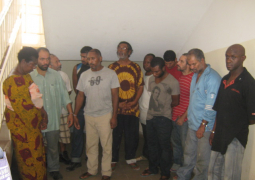
Says
Ibn Hazm, “It has come from ‘Umar, ‘Abdurahman ibn ‘Auf, Mu’azh ibn Jabal, Abu
Hurairah and other companions that anyone who skips one obligatory prayer until
its time has finished becomes an apostate. We find no difference of opinion
among them on this point.” This was mentioned by alMunzhiri in at-Targheeb wa
at Tarheeb. Then he comments, “A group of companions and those who came after
them believed that an intentional decision to skip one prayer until its time is
completely finished makes one an unbeliever.
The
people of this opinion include ‘Umar ibn al-Khattab, ‘Abdullah ibn Mas’ud,
‘Abdullah ibn ‘Abbas, Mu’azh ibn Jabal, Jabir ibn ‘Abdullah and Abu ad-Darda’.
Among the non-companions who shared this view were Ibn Hanbal, Ishaq ibn
Rahwaih, ‘Abdullah ibn al-Mubarak, anNakha’i, al-Hakim ibn ‘Utaibah, Abu Ayyub
as-Sakhtiyani, Abu Dawud at-Tayalisi, Abu Bakr ibn Abu Shaibah, Zuhair ibn
Harb, and others.
Some
hadith make it clear that such a person should be killed. For example:
Ibn
‘Abbas reported that the Prophet, upon whom be peace, said, “The ties of Islam
and the principles of the religion are three, and whoever leaves one of them
becomes an unbeliever, and his blood becomes lawful: testifying that there is
no god except Allah, the obligatory prayers, and the fast of Ramadan.” (Related
by Abu Ya’la with a Hassan chain.) Another narration states, “If anyone leaves
one of them, by Allah he becomes an unbeliever and no voluntary deeds or
recompense will be accepted from him, and his blood and wealth become lawful.”
This is a clear indication that such a person is to be killed.
Ibn
‘Umar related that the Messenger of Allah, upon whom be peace, said, “I have
been ordered to kill the people until they testify that there is no god except
Allah, and that Muhammad is the Messenger of Allah, and they establish prayer
and pay the Zakah. If they do that, their blood and wealth are protected from
me save by the rights of Islam. Their reckoning will be with Allah.” (Related
by alBukhari and Muslim.)
Umm
Salamah related that the Prophet, upon whom be peace, said, “There will be rulers
over you who will do good and evil things. Whoever hates these (latter) acts
will be innocent of them. Whoever denies them will be safe, but (not) one who
accepts and follows them.” They asked, “Should we kill them?” He said, “Not if
they pray.” (Related by Muslim.) Therefore, he made it unlawful to kill even an
unjust ruler who observes his prayers.
Abu
Sa’eed reported that ‘Ali, while he was in Yemen, sent the Prophet some gold,
which he then divided among four people. A man said, “O Messenger of Allah,
beware of Allah.” The Prophet said, “Woe to you. Of all the people of the
earth, am I not the most dutiful in being aware of Allah?” Khalid ibn al-Walid
said, “O Messenger of Allah, shall I kill him?” He said, “Perhaps he is one of
those who pray.” Khalid said, “How many people say with their tongues what is
not in their hearts?” The Prophet said, “I have not been ordered to look into
the hearts of people, nor to rip open their bellies.” (Abridged from al-Bukhari
and Muslim.) In this hadith also, prayer is given as the reason for not killing
a person. It is understood, therefore, that not praying would have resulted in
the person’s killing.
Even
though the preceding hadith clearly rule that one who discards salah becomes an
unbeliever and should be killed, many early and later scholars (excluding Abu
Hanifah, Malik and ash-Shafi) believe that such people become evildoers who
must repent.
If
such a person does not repent, he is to be killed, that being the prescribed
punishment, according to Malik, ash-Shai’i and others. Abu Hanifah maintains
that such a person is not to be killed, but must be given a minor punishment
and confined until he prays. They say the hadith that calls such people
unbelievers refer to those who deny the prayers, and so on. They say that any
other interpretation is contradicted by other texts. For example, Allah says,
“Lo! Allah does not pardon one who gives Him partners. He pardons all save whom
He wills” (an-Nisa’ 116). There is also a hadith related by Abu Hurairah and
recorded by Ahmad and Muslim in which the Prophet, upon whom be peace, said,
“Every prophet has a special supplication that is answered. Every prophet
hastened to make his supplication, but I concealed mine and will use it for my
nation on the Day of Resurrection.
It
will be granted--Allah willing--to whoever dies without associating any
partners with Allah.” Al-Bukhari also recorded that Abu Hurairah reported that
the Prophet, upon whom be peace, said, “The person who will be the happiest due
to my intercession is the one who says, ‘There is no god but Allah’ sincerely
from his heart.”
Says
ash-Shaukani, “The truth of the matter is that he becomes an unbeliever who is
to be killed for his unbelief. The hadith authenticates that Islamic law calls
one who does not pray an unbeliever. It has also put the performance as the
barrier between a believer and an unbeliever. Abandoning prayer means he may be
called an unbeliever. We need not concern ourselves with arguments presented by
those of the opposing opinion. We can say to them: It is not impossible that
some types of unbelievers may obtain forgiveness or may have a right to
intercession, such as the unbelief of those who pray to ( our) qiblah.
Nevertheless, the fact remains that they commit some sins which the Islamic law
views as unbelief. To turn to the other narrow interpretations is just
redundant.”
Who
Must Pray
Prayer
is obligatory upon every sane, adult Muslim. ‘Aishah related that the Messenger
of Allah, upon whom be peace, said, “The pen is raised for three (meaning:
there is no obligation upon three): one who is sleeping until he wakens, the
child until he becomes an adult, and one who is insane until he becomes sane.”
As
to the authenticity of this report, it is recorded by Ahmad, Abu Dawud,
at-Tirmizhi, an-Nasa’i, Ibn Majah, and al-Hakim, who grades it Sahih according
to the criterion of al-Bukhari and Muslim. AtTirmizhi classifies it as Hassan.
Although
it is not obligatory for a child to pray, it is a must that his guardian order
him to do so when he is seven, and he should beat him if he does not pray after
he reaches the age of ten. A minor should practice praying until he reaches
puberty. ‘Amr ibn Shu’aib related from his father on the authority of his
grandfather that the Prophet, peace be upon him, said, “Order your children to
pray when they reach the age of seven. Beat them (if they don’t pray) when they
reach the age of ten. And have them sleep separately.”
The
hadith is related by Ahmad, Abu Dawud, and al-Hakim. The latter grades it sahih
according to Muslim’s criteria.
The
Number of Obligatory Prayers
The
number of prayers prescribed by Allah is five. Ibn Mahyraiz narrated that
al-Makhdaji, from the tribe of Kananah, heard Abu Muhammad--a man in
ash-Shams--saying, “The witr prayer is obligatory.” He said he went to ‘Ubadah
ibn as-Samit and informed him of this. ‘Ubadah corrected him, saying, “Abu
Muhammad is mistaken. I heard the Messenger of Allah, upon whom be peace, say
‘Allah has laid five prayers upon His slaves. Whoever fulfills them and does
not miss any of them will have a pact with Allah that He will let him enter
Paradise. Whoever does not come with them will have no pact with Allah.
If
He wishes, He may punish him, and if He wishes, He may forgive him.” (Related
by Ahmad, Abu Dawud, an-Nasa’i and Ibn Majah.) In one version it states, “Or
one who comes with a deficiency in them or who degrades their duties.” Talhah
ibn ‘Ubaidullah narrated that a Bedouin with unkempt hair came to the Messenger
of Allah, upon whom be peace, and said, “O Messenger of Allah, inform me of
what Allah has made obligatory on me as regards praying.”
He
said, “Five prayers, unless you do others voluntarily.” He asked the Prophet to
inform him about fasting, and he said, “The fast of Ramadan, unless you do others
voluntarily.”
Then he asked him about charity...and the
Messenger of Allah informed him of the Islamic legislations. The Bedouin then
said, “By the One who has honored you, I shall not voluntarily add anything to
it, nor shall I be deficient in what Allah has ordered me to do.” The Messenger
of Allah, upon whom be peace, then said, “He will enter Paradise if he is
truthful (to what he said).” (Related by al-Bukhari and Muslim.)
To
be Continued
Read Other Articles In Article (Archive)
Man arraigned for being in possession of prohibited drug
May 14, 2012, 12:43 PM




